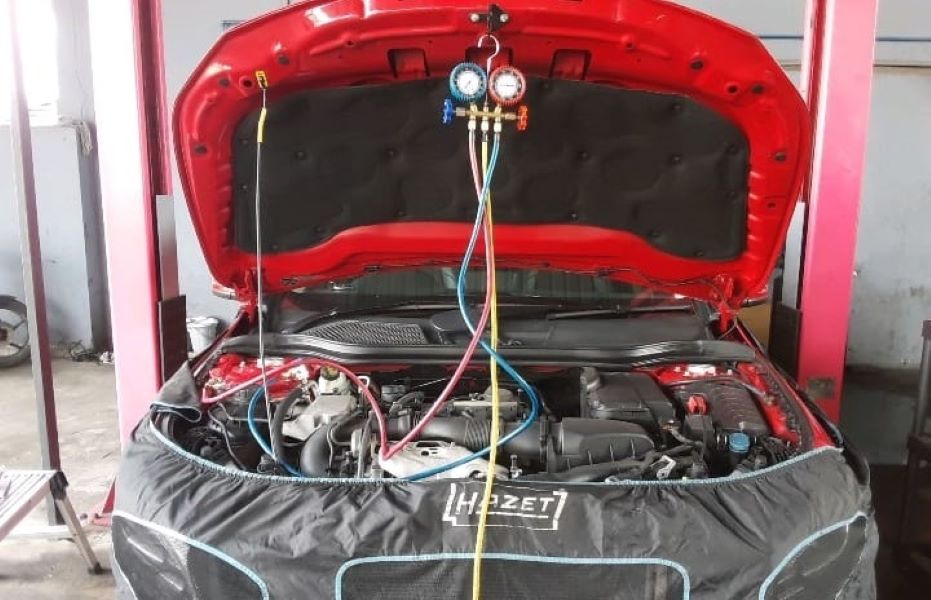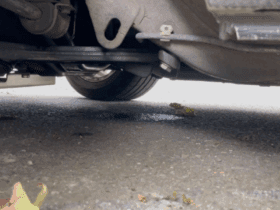Table of Contents
Mercedes Air Conditioning Not Working: Case Study in Mercedes-Benz CLA W117 (M270 Engine)
When the Mercedes air conditioning is not working, it can quickly turn a comfortable ride into a frustrating experience, especially in hot weather. This issue is not uncommon in modern Mercedes-Benz vehicles, where climate control systems rely on a network of sensors, pressure regulators, and control units.
In this article, we explore a real-world case study involving a Mercedes-Benz CLA W117 equipped with the M270 Engine. The vehicle arrived with the customer’s complaint of “Mercedes air conditioning not working.” Through a structured diagnostic process, the root cause was identified as a faulty refrigerant pressure sensor, and the system was restored to full function.
This guide will walk you through the diagnosis, solution, and preventative measures to help you troubleshoot similar issues in your Mercedes.

Complaint Overview
- – Vehicle: Mercedes-Benz CLA W117 (M270 Engine)
- – Customer Complaint: Air conditioning not working, no cooling effect.
The customer reported that the air conditioning system stopped functioning, making summer driving uncomfortable. Beyond comfort, this raised concerns about the reliability of the HVAC (Heating, Ventilation, and Air Conditioning) system.
Step-by-Step Diagnostic Process
1. Scanning for Fault Codes
- – Action: Connected a diagnostic scanner to the vehicle’s control modules.
- – Finding: Fault code stored in the AAC (Automatic Air Conditioning) system related to the refrigerant pressure sensor.
- – Interpretation: Since this sensor plays a vital role in monitoring and regulating refrigerant pressure, a malfunction could disable the AC system.
2. Checking Refrigerant Pressure
Interpretation: This ruled out major refrigerant leaks or undercharge. The sensor fault was likely not due to low refrigerant.
Action: Used manifold gauges to verify refrigerant circuit pressure.
Finding: Pressure readings were within normal limits.


3. Assessing Sensor Power Supply and Signal
- – Action: Tested the voltage supply and signal line at the refrigerant pressure sensor.
- – Finding: Both power and communication signals were correct.
- – Interpretation: Wiring and ECU communication were intact. This pointed toward internal failure of the sensor itself.

Root Cause
The refrigerant pressure sensor was defective, despite the wiring and refrigerant levels being normal. Because the AC system relies on accurate pressure data, a faulty sensor prevented the compressor from engaging, leaving the customer with no cold air.
Solution – Fixing the Mercedes Air Conditioning Problem
1. Replaced the Refrigerant Pressure Sensor
- – Removed the faulty sensor.
- – Installed a genuine Mercedes-Benz replacement part to ensure proper durability and compatibility.
2. System Recharge and Reset
- – Verified refrigerant charge and pressure after replacement.
- – Cleared fault codes from the AAC system.

Outcome
After the repair:
- – The air conditioning system operated normally.
- – Cold air was delivered consistently.
- – No fault codes reappeared in the AAC system.
- – The customer left the workshop fully satisfied.
This confirmed that replacing the refrigerant pressure sensor resolved the “Mercedes air conditioning not working” complaint.

Quick Reference Table – Diagnostic Summary
| Step | Action | Finding | Result |
|---|---|---|---|
| Fault code scan | Checked AAC system | Refrigerant pressure sensor fault stored | Proceed to confirm sensor issue |
| Pressure test | Measured refrigerant | Pressure within spec | No leak or undercharge |
| Sensor test | Checked voltage & signal | Power supply correct, signal faulty | Sensor defective |
| Repair | Replaced sensor | Genuine Mercedes part installed | AC system restored |
Explore More Mercedes AC and Climate Control Issues
For a deeper dive into all AC-related issues, visit our hub page: Mercedes AC and Climate Control Problems – Complete Troubleshooting Guide. You’ll find grouped case studies, step-by-step diagnostics, and prevention tips.
Key Takeaways for Owners
If your Mercedes AC is not working, consider these checks:
- – Scan for fault codes in the AAC or HVAC control unit.
- – Verify refrigerant pressure with gauges before assuming a leak.
- – Check sensors and wiring especially the refrigerant pressure sensor.
- – Use genuine parts for reliability and accurate system performance.
Preventative Tips
- – Service AC system every 2 years: Includes refrigerant recharge and leak checks.
- – Replace cabin filters annually: Dirty filters reduce cooling efficiency.
- – Inspect sensors periodically: A faulty sensor can shut down the entire AC.
- – Act early on weak cooling: Ignoring minor issues can lead to compressor failure.
FAQs – Mercedes Air Conditioning Not Working
Q1. Why is my Mercedes air conditioning not working even though the fan is running?
Often the refrigerant pressure sensor is defective, preventing the compressor from engaging even when the blower works.
Q2. Can low refrigerant cause Mercedes AC failure?
Yes, but in this case study, refrigerant levels were normal. Always check refrigerant pressure before replacing parts.
Q3. How do I know if my refrigerant pressure sensor is faulty?
If fault codes indicate sensor failure and refrigerant levels are normal, the sensor is likely defective.
Q4. How much does it cost to replace a Mercedes refrigerant pressure sensor?
On average, between $200–$400 depending on labor rates and model.
Q5. Will generic AC sensors work in a Mercedes?
It is strongly recommended to use genuine Mercedes parts, as aftermarket sensors may give incorrect readings or fail prematurely.
Conclusion
This case study of a Mercedes-Benz CLA W117 with M270 engine illustrates how a faulty refrigerant pressure sensor can cause the complaint “Mercedes air conditioning not working.”
By following a structured diagnostic process scanning codes, checking refrigerant levels, and testing sensor signals the true cause was identified and resolved.
For Mercedes owners, the lesson is clear: when your air conditioner stops working, don’t assume it’s just low refrigerant. A deeper diagnosis may reveal sensor or electronic faults that are just as critical to restoring cooling performance.
Author
Written by: Mercedes Expert
Automotive Technical Trainer & Mercedes-Benz Diagnostic Specialist
With years of hands-on experience repairing and diagnosing Mercedes-Benz vehicles, specializes in case-study-based troubleshooting guides that blend workshop accuracy with educational clarity.
Last Updated: August 2025
— Salim, Mercedes Expert
Independent specialist in Mercedes-Benz diagnostics, CAN Bus analysis, troubleshooting case studies, and EV systems.







Leave a Reply